
Pest Library
A Guide To The Common Pests Of Queen Creek & Phoenix Metro
Pests are a problem for everyone; the insects, arachnids, and rodents that live near us have learned to take advantage of the basic needs people and our properties provide them. The more you know about the pests common to our area, the easier it will be to protect yourself, family, and property from the problems they create. To help you guard your Queen Creek home against the pests that also call Arizona home, partner with the local pest control experts at Canopy Pest Control. We are a family owned and operated company that is committed to protecting your family from our area's most troublesome pests!
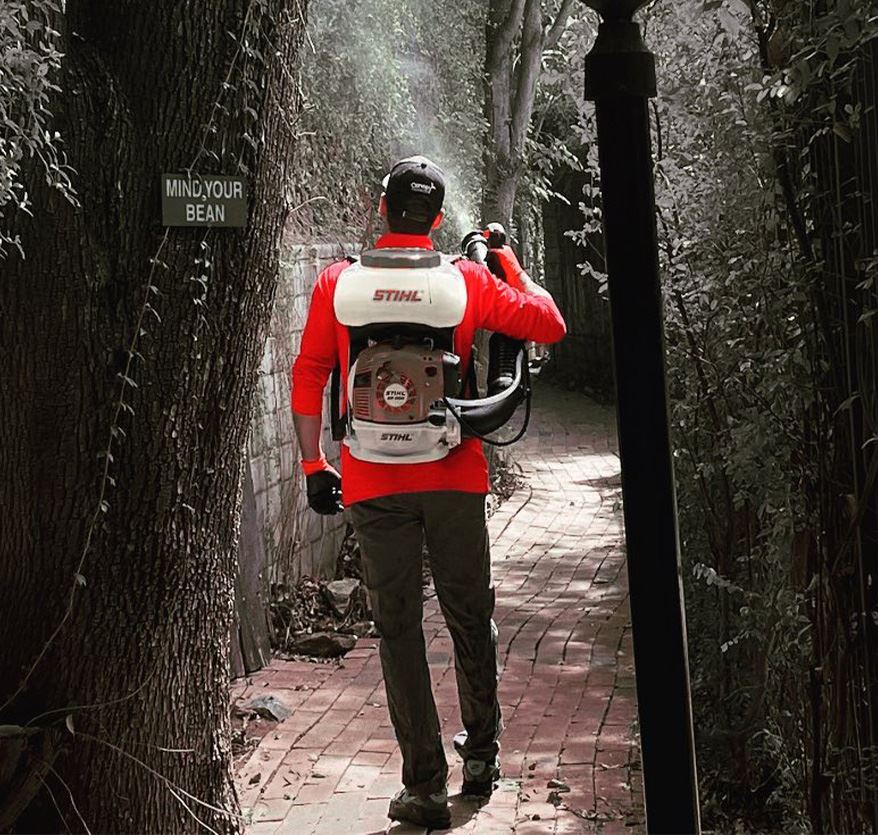
Our Pest Library
Learn more about some of the most common household pests!
-
Ants
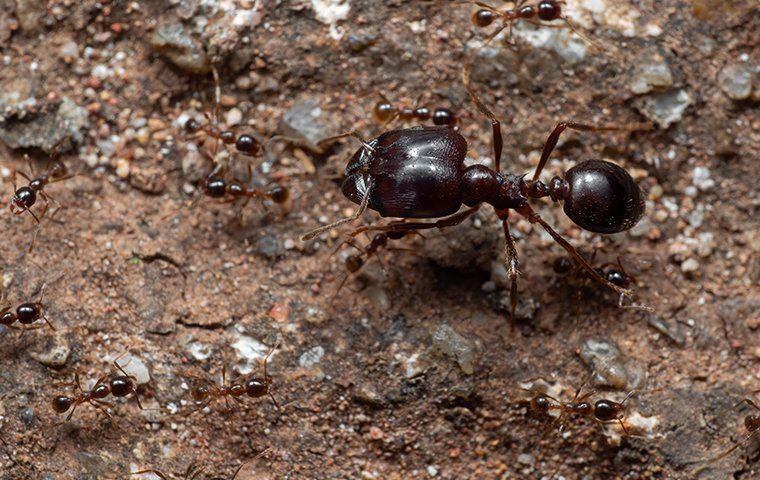 Ants are insects that live together in large numbers and throughout most of the year are a problem for those living in Queen Creek, Arizona. In our area, sugar ants, odorous house ants, big-headed ants, and Argentine ants are problematic. While these ants aren't considered dangerous, they are unwanted as they invade in large numbers, are difficult to remove, spread bacteria, and contaminate our food.
Ants are insects that live together in large numbers and throughout most of the year are a problem for those living in Queen Creek, Arizona. In our area, sugar ants, odorous house ants, big-headed ants, and Argentine ants are problematic. While these ants aren't considered dangerous, they are unwanted as they invade in large numbers, are difficult to remove, spread bacteria, and contaminate our food.Ants may be common household pests, but that doesn't mean they should be allowed to live freely on our properties. Ants are omnivores and feed on various things, including seeds, small insects, honeydew, sweet liquids, and proteins. They often gather in our gardens and around trash cans, recycling bins, and compost piles because they feed on many of the same foods we do. The food we unintentionally provide them is what often attracts ants to our properties.
To communicate with each and alert the worker ants in a colony to a new food source, ants produce pheromones and send messages through vibrations they receive through their sensitive antennae and legs. Ants move into our homes and other structures, while out foraging for food. If they gather food for their colony in the trash can right next to your kitchen door, it is easy for them to move inside through gaps around the door to search for more food. Ants colonies are huge, so the more ways to feed their colony, the better! Once inside, it is common for the ants to create a satellite nest in warm moist areas behind walls or under floors, near hot water pipes, behind sinks, under tubs, or behind cabinets and appliances.
To help you protect your Queen Creek, AZ property from unwanted pests such as ants, our professionals have put together some tips:
- Store trash cans and recycling bins away from the outside walls of your home.
- Seal gaps under and around exterior doors.
- Maintain gardens, regularly harvesting fruits and vegetables.
- Check your foundation for cracks or openings and repair any you find.
- Reduce the moisture in your home that attracts ants by using dehumidifiers and repairing leaking fixtures and pipes.
- Keep your kitchen and eating areas free of the crumbs and spills ants search for.
- Put a year-round pest control program in place to keep your property free of ants and other pests.
-
Cockroaches
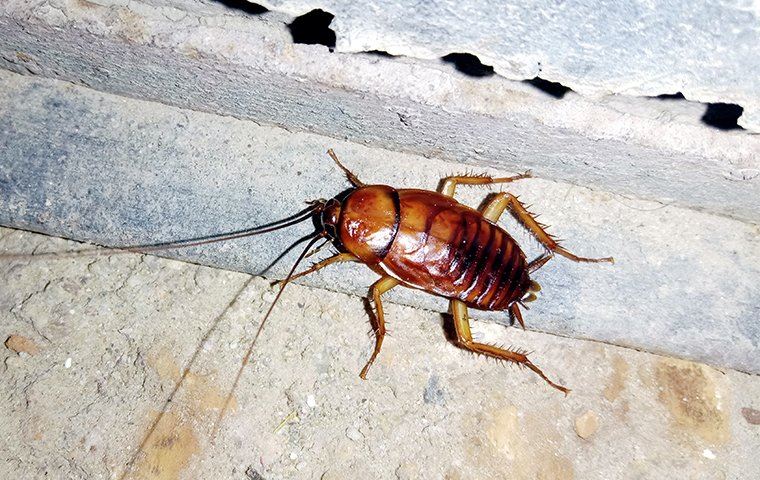 If you have cockroaches living in your home, more often than not, they are either German cockroaches, American cockroaches, Oriental cockroaches, or brown-banded cockroaches. All four have learned the benefits of living with people inside our homes or businesses. Our structures provide cockroaches with everything they need, such as warm shelter, water, and access to many food sources.
If you have cockroaches living in your home, more often than not, they are either German cockroaches, American cockroaches, Oriental cockroaches, or brown-banded cockroaches. All four have learned the benefits of living with people inside our homes or businesses. Our structures provide cockroaches with everything they need, such as warm shelter, water, and access to many food sources.Cockroaches often find a way into our properties through spaces in exterior walls, under doors, or through vents and drains. They also move inside in things like boxes, deliveries, and used furniture or appliances. Cockroaches will thrive in any building where food is prepared or stored because the food supply is unlimited.
To communicate with each other, cockroaches produce specific pheromones. Having large groups of cockroaches living within a home is never ideal; in addition to contaminating our food and affecting its taste, they increase the risk of asthma in children, trigger allergy symptoms, and cause skin rashes. They also spread many diseases (salmonellosis, E. coli, dysentery) that cause vomiting, diarrhea, and other serious health problems. A cockroach infestation can happen inside any home or business. Their flat oval-shaped bodies allow cockroaches to move easily through structures and hide in tight spaces. Because they're nocturnal, they are active while we are sleeping. It is typically not until the infestation grows to a large number that you see the cockroaches during the day, or notice their pepper-like excrement and realize the issue at hand.
Here are some helpful tips from our professionals at Canopy Pest Control to protect your Arizona property from cockroach infestations:
- Inspect deliveries, furniture, and electronics for hiding or hitchhiking cockroaches before bringing those items into your house.
- Keep door sweeps on your exterior doors and seal any cracks or openings in walls, along baseboards, or around pipes.
- Keep roaches from finding food sources on your property by placing tight-fitting lids on garbage cans, compost bins, and recycling bins.
- Minimize clutter in drawers, cabinets, closets, and basements where cockroaches can hide.
- Put an annual pest control program in place to keep your property free of cockroaches and other pests.
-
Rodents
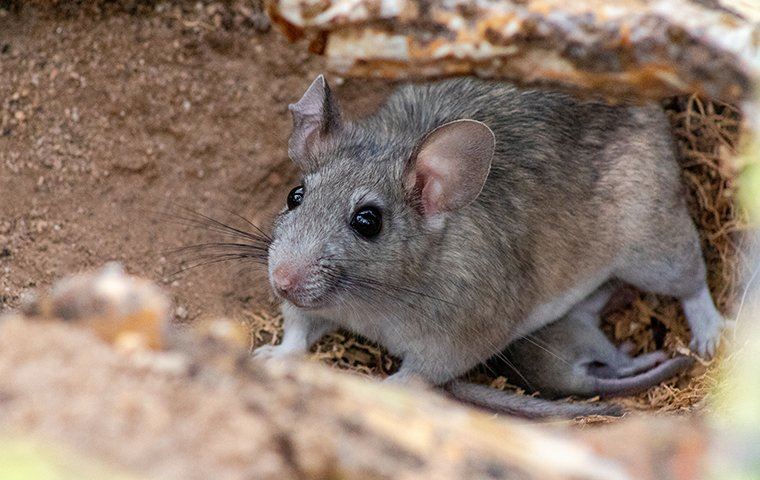 Rodents are prevalent pests that most home and business owners have to deal with at one time or another. Rodents love to move into our yards and structures because both provide everything they need to survive. Rodents that regularly try to turn our Arizona homes and businesses into a place they can nest and feed are house mice, field mice, roof rats, and pack rats.
Rodents are prevalent pests that most home and business owners have to deal with at one time or another. Rodents love to move into our yards and structures because both provide everything they need to survive. Rodents that regularly try to turn our Arizona homes and businesses into a place they can nest and feed are house mice, field mice, roof rats, and pack rats.All are usually attracted to our yards because there is food present. Rodents have a keen sense of smell and love to forage for food inside trash cans, compost bins, gardens, pet food bowls, animal feed bins, and outdoor eating areas. They also forage for food inside our homes, lured by the aromas emanating from our kitchen and pantry areas.
While rodents may feel a sense of comfort when living near us, the feeling is not mutual! Rodents cause many problems, including spreading diseases through their urine, feces, and saliva. Rodents also carry parasites on their bodies that also spread pathogens that can make us ill. Rodents use their sharp front incisors to chew their way into food packing and through wires, pipes, drywall, siding, and flooring. Another concern with rodents is that they are prolific breeders, and just a few finding their way onto your property can quickly lead to a big problem. The more rodents on your property, the more damage they'll cause. Some of the most common hideouts for rodents include dense vegetation, woodpiles, overgrown gardens, ground holes, attics, basements, wall voids, and crawlspaces. If you discover rodent droppings in your home, hear scratching noises behind your walls, or begin to notice a musty smell, rodents are a likely culprit.
It's important to protect your Arizona property from rodents. Follow these prevention tips from our professionals below:
- Take the time to regularly inspect your home's exterior and seal any spaces you find using a rigid rodent-proof material.
- Place covers on vents, repair roof damage, and put caps on chimneys.
- Keep your grass cut short and maintain garden and landscaped areas to keep them from becoming overgrown.
- Keep food away from rodents by keeping kitchen areas clean, placing locking lids on trash cans, putting away uneaten pet food, and storing animal feed in metal containers with lids.
- Reduce the clutter in and around your home to stop rodents from hiding there.
- Put a year-round pest control program in place to prevent problems with rodents.
-
Scorpions
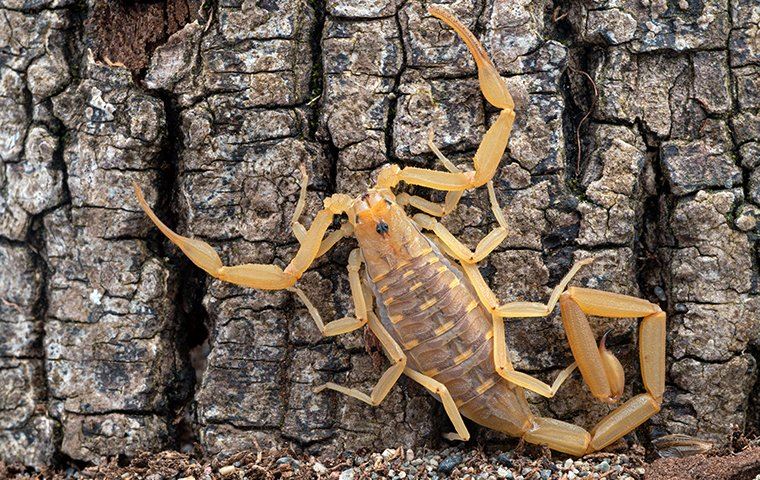 The bark scorpion is one of the most well-known scorpion species living in the United States because they can be harmful to people. They are also the most widespread scorpion species residing in the Queen Creek, AZ area. The bark scorpion is a nocturnal, small species with adults growing to about two and a half inches in length.
The bark scorpion is one of the most well-known scorpion species living in the United States because they can be harmful to people. They are also the most widespread scorpion species residing in the Queen Creek, AZ area. The bark scorpion is a nocturnal, small species with adults growing to about two and a half inches in length.These arachnids have tan bodies with slightly darker backs. The bark scorpion's claws and segmented, curved tail is thinner than other species. At the end of the bark scorpion's tail is a stinger they use to inject venom into their prey. They also use the stinger as a means of defense. An interesting fact about bark scorpions is that under UV light, they glow a bright bluish color.
Scorpions are dangerous because they possess venom that is strong enough to trigger allergic reactions, some that can become quite severe, depending on the person. Properties their favorite food sources can have problems with scorpions. Scorpions hunt and feed on insects, spiders, small rodents, and other scorpions. Despite thriving in our desert climate, scorpions have high moisture needs and require a reliable water source. Our homes and yards often provide scorpions with the moisture they require like leaking hoses, dripping faucets, and dripping air conditioners. These eight-legged creatures often wind up in our homes while searching for water or following their prey. Moving through spaces in the exterior of your house, scorpions will take up residence in damp areas — basements, bathrooms (sinks and tubs), kitchens, and crawlspaces.
Your home or business can be protected from scorpions if you follow these steps below:
- Seal gaps in the foundation and openings in your structure's exterior walls to keep scorpions from being able to move inside.
- Place weatherstripping around windows and doors.
- Reduce humidity levels in your home by using dehumidifiers in the basement.
- Repair dripping hoses, faucets, and pipes.
- Make sure gutters and downspouts are directing water away from the outside walls of your home.
- Reduce clutter in your yard and home to give scorpions fewer hiding spots.
- Put a year-round pest control program in place to eliminate food sources (prey) from your property.
-
Spiders
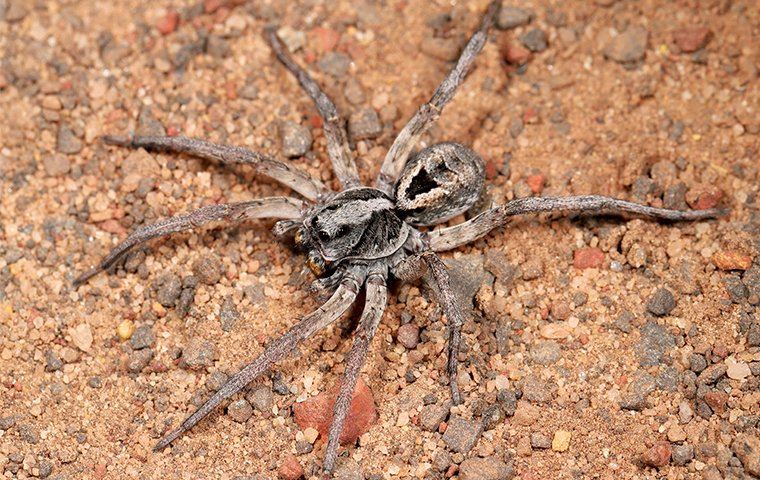 There are many species of spiders living throughout Arizona. Examples include the large, fast-moving wolf spider and the dangerous black widow spider, neither you want living on your property in large numbers! Like scorpions, spiders are arachnids and predators. Lots of insects and garden pests attract spiders to a property.
There are many species of spiders living throughout Arizona. Examples include the large, fast-moving wolf spider and the dangerous black widow spider, neither you want living on your property in large numbers! Like scorpions, spiders are arachnids and predators. Lots of insects and garden pests attract spiders to a property.The more food available, the more predators will be around. Spiders are efficient hunters that use the webs they produce to catch prey or by physically chasing after and hunting down their prey. Wolf spiders prefer to chase down their prey, while black widow spiders use their webs.
In our area, the black widow spider is the most cause for concern. If a bite occurs, the venom they inject into a person's skin with their fangs is strong enough to cause serious health concerns. The wolf spider is a species that is not a health concern to people, but their quick movements and large size make them a pest you don't want to see scurrying across the floor of your home. The biggest reason spiders become a problem inside our homes is they follow insects inside that are looking for a place to overwinter or searching for food and water. Spiders may also move inside through spaces in the exterior walls while searching for a dark, quiet place to lay their eggs.
In order to protect your Queen Creek, AZ home or business from spiders, our professionals want to offer some helpful prevention tips.
- To keep spiders out of your home, place door sweeps on exterior doors, and replace worn weatherstripping.
- Place covers over vents and drains, and repair damaged trim around windows and doors.
- Keep lids on trash cans, compost bins, and maintain gardens and compost bins to keep foraging insects off your property.
- Remove leaf piles, woodpiles, fallen trees, and other debris from your yard where spiders nest.
- Keep storage areas in your house free of the clutter where spiders can hide.
- Put an annual pest control program in place to reduce the number of insects available for spiders to eat.
-
Termites
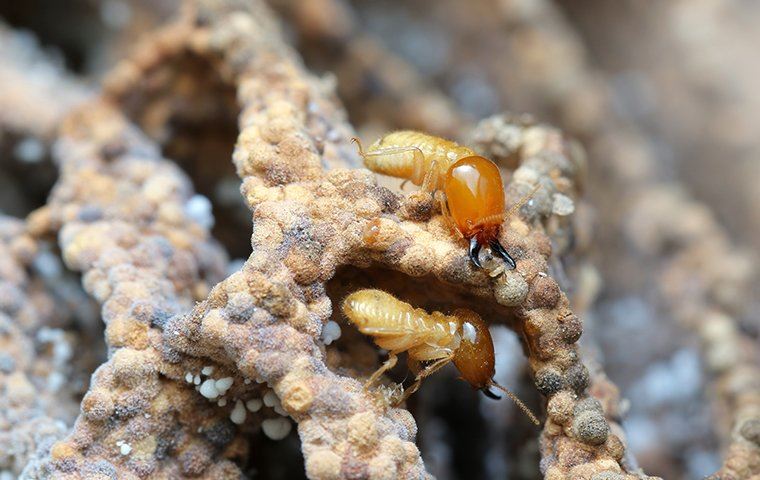 Subterranean termites are widespread across the United States and throughout Arizona, and are responsible for much of the five billion dollars in damages that termites cause each year. Termites are one of the few organisms able to feed on the cellulose in wood and other plant materials, making them a vital part of the ecosystem. Outside, in wooded areas and other habitats, termites help clear the ground of decaying debris. But, when termites nest in our yards or travel into our homes to feed, they become a huge liability and a serious issue.
Subterranean termites are widespread across the United States and throughout Arizona, and are responsible for much of the five billion dollars in damages that termites cause each year. Termites are one of the few organisms able to feed on the cellulose in wood and other plant materials, making them a vital part of the ecosystem. Outside, in wooded areas and other habitats, termites help clear the ground of decaying debris. But, when termites nest in our yards or travel into our homes to feed, they become a huge liability and a serious issue.A termite infestation can develop on any property that offers moisture and food sources — wooden structures, fallen trees, woodpiles, brush piles, or other plant materials. Worker termites travel from their nest to a food source each day through the soil or the mud tubes they create. Subterranean termites find their way into structures through cracks in the foundation or wooden structures, making direct contact with the ground. Once inside, they move into structural wood behind walls and under floors near pipes and around doors or windows. Besides causing issues in our homes, subterranean termites cause problems in our yards, feeding on wooden play structures, furniture, and fencing.
To protect your Arizona property from becoming a place termites call home, our professionals want to offer some helpful prevention tips.
- Get rid of leaf piles, decaying wood mulch, fallen trees, and tree stumps that attract hungry termites.
- Eliminate areas of standing water near your home and fix leaky pipes and fixtures that damage wooden structures.
- Lower humidity levels in your house by using dehumidifiers and repairing leaking pipes.
- Repair any cracks or crevices that allow termites to move into our structures.
- Remove older or decaying wooden structures from your property like fences, playsets, or decks.
- Put a termite control program in place to keep these damaging pests out of your house throughout the year.
-
Common Household Invaders
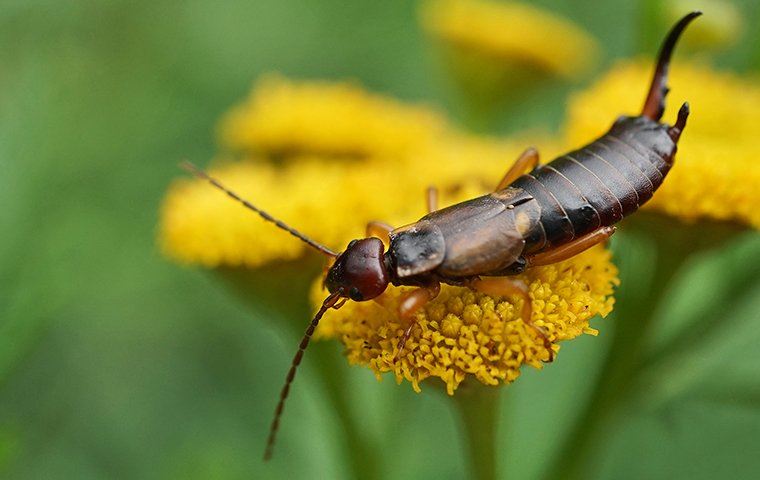 The phrase "common household invaders" describes insects that successfully live outdoors but regularly invade our homes. Some of the most regular household invaders in Arizona include crickets, silverfish, and earwigs. All are moisture-seeking pests that, more often than not, move inside after it becomes too hot or dry outside.
The phrase "common household invaders" describes insects that successfully live outdoors but regularly invade our homes. Some of the most regular household invaders in Arizona include crickets, silverfish, and earwigs. All are moisture-seeking pests that, more often than not, move inside after it becomes too hot or dry outside.You'll typically find these pests at ground level and in the humid areas of a home, such as basements, crawlspaces, bathrooms, and kitchens. Because they move inside in large numbers, crickets, silverfish, and earwigs are all frustrating pests to deal with and challenging to eradicate.
Common household invaders are typically not dangerous. They don't bite, sting, or spread diseases. They do, however, contaminate food and chew on things like clothing, boxes, dry goods, fabrics, and more. Inside, some of their favorite hiding spots include storage boxes, folded linens or blankets, areas around drains, vents, and areas under sinks. Outside, common household pests often live close to the exterior of homes and other structures in flower beds, mulch, woodpiles, and under trash cans. If it becomes necessary for them to seek better living conditions, their proximity to our homes makes it easy for them to find a way inside. Entry points include cracks in the foundation, through vents, gaps under doors, and spaces around basement windows.
Below are some tips to prevent some of these common household invaders:
- Cut back overgrown shrubs and trees branches from your home's exterior walls and roofline.
- Leave a barrier between any mulch and your foundation.
- Repair defects in your foundation, spaces around windows and doors, and damaged trim.
- Store trash cans and recycling bins up off of the ground and away from the outside of your home.
- Use dehumidifiers to eliminate the moisture in your home that these insects seek.
- Partner with a pest professional before occasional invaders have the chance to move into your home!
For property owners looking to guard against scorpions, bed bugs, ants, and other Queen Creek pests, reach out to Canopy Pest Control to receive our home pest control and commercial pest management solutions today!

Hear From Our Happy Customers
Serving San Tan Valley, AZ Since 2011
-
"One of the best for customer service!"Justin stopped by and explained to me about Canopy Pest Control. I sensed their confidence, culture, and customer commitment while talking to him. Here I am more than 1 year, same quality service same commitment. I am so happy with Canopy Pest!- Rajat S.
-
"Everyone is so nice!"I have worked with Sam off and on for the last 4 years. He is very informative and always happy to help. I love Canopy Pest Control, everyone is so nice!! Thank you for all you do!- Luanna G.
-
"Cameron is absolutely amazing!"He is very efficient, very friendly, quick response, and reasonable, and answers any questions! We highly recommend him and his company!!- Murray C.
-
"Sam rocks!!!"Sam is the best! He goes over and above what is expected and always with a smile! He listens to any concerns and addresses everything.- Gail D.
-
"Kathy and her team are amazing!"The best pest control company. They are always available when I need them.- Rima T.
-
"The very best techs I've ever had!"I have been with Canopy Pest Control for years on and off in many of my different homes. They have always been the absolute best at what they do. Chris really goes above and beyond for us. Thanks, Canopy for always coming through for me and for hiring only- Chris D.
-
"Been using them since 2019. I have no complaints, they do what they say and do it well!"- Lonni H.
-
"Very professional!"I have done business with Canopy for a few years now, and they have been great in resolving the scorpion/pest issues that we had when we first moved into our new house. I would highly recommend them. Specifically, Sam Branch is truly outstanding!!- Lino R.



